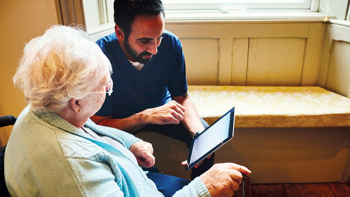
What is reflective practice?
Reflective practice is a strategy or approach with a rich history across several disciplines. Predominantly starting in education and philosophy, the approach evolved and gained attention in healthcare in the late 20th century to improve patient care and promote continuous professional development.
Over time it slowly began to be adopted in social care to help deliver better person-centred care. Since it spread into professional standards, it has become more widespread encouraging individuals to reflect on professional practice with themselves, a colleague, or a team, as a way to deal with and maintain high levels of pressure within the workplace.
It allows and encourages teams to share their learning experiences so the insights that have been discovered and developed within the process can then be applied to maintain good practice in the future.
Reflective Practice in Health and Social Care – What is it?

Reflective practice in health and social care involves professionals critically analysing and evaluating their experiences, actions, and decisions to enhance learning and improve future practice.
Through using reflective practice it helps health and social care professionals work collaboratively to share learning experiences and guidance on how best to deal with similar situations in the future, as well as find strategies to help overcome the challenges facing the health and social care market to ensure the best quality care is consistently delivered.
Reflective practice in both health and social care aims to enhance the quality of care provided to individuals or communities, and promote self-awareness, and continuous learning. By reflecting on their practice, health and social care professionals can identify areas for improvement and adapt their care deliveries accordingly to provide better patient care.
Health and social care professionals consistently reflecting on their practice can help build stronger multi-disciplinary teams to reduce the dependency on one another and increase independence in individuals to provide more options and choices in how their care, support, and treatment are delivered.
Why is reflective practice important in healthcare and social care?
Reflective practice is important in healthcare and social care for several different reasons. Ultimately both reflective practices allow health and social care professionals to maintain high standards of care, adapt to evolving challenges across the market, and foster a new way of working that concentrates on continuous improvement.
Through reflective practice, health and social care professionals can create stronger multidisciplinary teams to make better use of their resources, improve social care commissioning processes, as well as the clinical decisions that need to be made.
Here local authorities can work alongside health and social care professionals to improve their co-production approaches to deliver better outcomes-based commissioning concentrating on developing a well-led, sustainable, and diverse market suitable to all health and social care needs.
The table below shows more specific reasons for the importance of reflective practice in healthcare and social care.
|
Importance of reflective practice in healthcare |
Importance of reflective practice in social care |
|
Quality improvement |
Enhances Self-awareness |
|
Improves clinical-decision making |
Improves decision-making |
|
Delivers better person-centred care |
Quality Improvement |
|
Offers better professional growth and continuous learning |
Delivers a better person-centred approach |
|
Encourages more collaborative work to improve patient outcomes |
Creates more effective communication with individuals, their loved ones, social care providers, and carers |
|
Helps build emotional resilience |
Better equips teams to be more adaptable and work with commissioning teams to reach demand |
|
|
Offers better professional growth and continuous learning |
The table above shows that reflective practice has many benefits in health and social care and that a lot are similar. The thing that differs about these benefits is either the professional or individual it impacts, or the environment it benefits.
For example, reflective practice offers better professional growth and continuous learning for both health and social care. Typically in healthcare, continuous learning benefits clinicians which in turn impacts patients for the better, and similarly, in social care the benefits of professional growth and continuous learning benefit social care workers and social providers, which again in turn impacts individuals using the social care support.
Again in healthcare, it offers better patient-centred care, and in social care, it offers better person-centred care. Some of the main differences in the benefits of reflective practice in health and social care have to do with the benefits it has on social care commissioning. For example, it allows local authorities and social care providers to work better together and be more adaptable to change. This, in turn, increases stakeholder engagement to allow better strategic commissioning to take place to benefit every individual in the community.
Examples of reflective practice in health and social care
As discussed above reflective practice can be used and applied in multiple different ways. Depending on the approach used, the types of reflective practice used in both healthcare and social care can be different. However, some of the most common examples of reflective practice in health and social care include:
- Critical Incident Reports – e.g. Analysing specific events or situations to understand the factors that contributed to their outcomes and lessons learned
- Group Reflection Sessions – e.g. Participating in group discussions or team meetings to share experiences, perspectives, and insights to collectively learn from one another
- Clinical Supervision – e.g. Engaging in regular one-to-one sessions with a supervisor or mentor to reflect on your practice to receive feedback and explore professional growth opportunities
- Reflective Writing – e.g. Keeping reflective journals to document experiences including feelings, and lessons learned
- Simulation and role-play – e.g. Participating in simulated scenarios or role-playing exercises to reflect on practice skills, decision-making, and communication skills
Some examples however are more specific for health, social care, and in particular care homes.
Examples of reflective practice in healthcare:

- Clinical Decision Making – e.g. Reflecting on complex medical cases to consider alternative approaches and critical judgement to improve outcomes
- Patient Interaction Reflection – e.g. Reflecting on challenging conversations with patients to identify strategies to improve communication for future interactions
- Patient Outcomes Evaluation – e.g. Reflecting on outcomes following a specific treatment or intervention including patient feedback to adjust approaches for future treatments to improve outcomes and patient wellbeing
Examples of reflective practice in social care:

- Case Reviews – e.g. Reflecting on past cases to evaluate interventions, outcomes, and areas to improve
- Feedback – e.g. Seeking feedback from service users and their loved ones to understand their experiences to inform future practice
- Critical Incident Debriefing – e.g. Reflecting on critical incidents or challenging situations to identify key learning points for the future
- Community engagement – e.g. Reflecting on community engagement initiatives to assess their effectiveness in promoting social inclusion and increasing independence
Examples of reflective practice in care homes:

- Case Conferences – e.g. Holding regular meetings with care staff, nurses, and other key health and social care professionals to discuss individual residents’ needs, challenges, and progress
- Quality Improvement Reviews – e.g. Reflecting on audit findings, incident reports, and feedback from residents and families to identify areas for improvement in care delivery, safety protocols, and communication
- Celebrating successes – e.g. Taking time to recognise and celebrate achievements, positive outcomes, and examples of excellent care provisions to foster a culture of learning, appreciation, and continuous learning
Reflective practice in health and social care – How does it work?
For reflective practice to work across health and social care, there is different guidance that should be followed as well as plenty of models and approaches to choose from.
Within the Standards of Proficiency, it is highlighted that all health and social care professionals must:
- Understand the value of reflective practice and the need to record the outcomes of such reflection to support continuous improvement
- Recognise the value of multi-disciplinary reviews, case conferences, and other methods of review
These guidelines reflect the idea that no health or social care professional should ever stop learning, instead, they should:
- Keep their skills and knowledge up to date and understand the importance of continuing professional development throughout their career
- Keep knowledge and skills up to date and relevant to your scope of practice through continuous professional development
According to the CQC, health and social care professionals should complete reflective practice every 6 weeks, other governing bodies think that this should be regular, but again this can depend on how best an individual or an organisation may work, adapt, and change.
For reflective practice across health and social care to be successful it requires honesty and self-critical assessment. This way all health and social care professionals can take a focused approach to share learning experiences to improve outcomes in the future. Sometimes this can happen and work by using a reflective practice, one of the most common being Gibb’s reflective cycle. Within this cycle, it identifies 6 steps that each health and social care professional should take regardless of what they are reflecting on including:
- The description – What happened?
- Feelings – What were you thinking and feeling?
- Evaluation – What was good and bad about the experience?
- Analysis – What sense can you make of the situation?
- Conclusion – What else could you have done?
- Action Plan – If it arose again, what would you do?
Some cycles also include 2 additional steps:
- Implementation – How are you going to apply your insights in everyday practice?
- Re-evaluation – Did your action plan work and what needs adjusting?
It is important to note there is no set way for reporting reflections it can differ depending on the situation that is being reflected upon as well as personal style of learning. It is essential however to not just do the reflective practice but to understand what it shows, so no one gets complacent to consistently grow and develop professionally to improve outcomes further.
Reflective Practice templates in health and social care
A reflective practice template in health and social care can provide a more structured framework for health and social care professionals to systematically reflect on events, experiences, feelings, learning, and growth.
Below is a typical and basic template that can easily be adapted depending on the individual needs of the health or social care professional.
|
Title |
Brief description of the reflection topic |
|
Date |
Date of the reflection |
|
Description |
Briefly describe the situation, event, or experience including relevant context and participants involved |
|
Feelings |
Identifying and exploring the emotions and reactions experienced during the situation and after. Consider both positive and negative feelings and their impacts on your practice |
|
Evaluation |
Reflecting on the strengths and weaknesses of your actions, decisions, and communications during the event to consider what went well and what could be improved |
|
Analysis |
Analyse the factors that influenced the event including personal beliefs, values, assumptions, and external factors |
|
Conclusion |
Summarise the key insights and lessons learned from the reflection by considering how this event has contributed to your professional development and what changes would need to happen in the future if a similar situation occurred |
|
Action Plan |
Identify the specific actions or strategies you will take based upon the reflection including areas for further learning and skills development as well as changes in practice. Make sure all goals are measurable and achievable on a set timeline to be reviewed again. |
|
Follow-up |
Outline how the action plan will be monitored and evaluated including any additional resources that might be needed to achieve the goals |
How can technology improve reflective practices in health and social care?
Like most things across health and social care, technology can help improve outcomes significantly, and reflective practice is no different. It can both help streamline the actual process as well as help implement an action plan more successfully. Below are just some examples of how technology can streamline reflective practice in health and social care:
1. Digital Journals

One of the most obvious ways technology can help improve reflective practices across health and social care is with digital journals. Here this offers health and social care professionals a digital, more convenient, and secure way for professionals to document their reflections, as well as review previous reflections over time all in one place.
Some digital journal platforms also offer additional features including multimedia integration and tagging to make reflections easier to organise and re-evaluate over time.
2. Mobile apps

Mobile apps also help digitise reflections further, especially when health and social care professionals are on the go.
Some apps designed for reflective practice can include prompts, reminders as well as customisable features to ensure no stage in the reflective process is forgotten about, even in busy times and environments.
3. Data analytics

One of the most strategic ways technology can help improve reflective practice in health and social care is by using data analytics. Here trends and patterns can be collected and evaluated from various sources to create an analysis that can identify common challenges, training needs, and areas for improvement across teams, departments, and the individual themself.
4. E-learning platforms

It is important to note that reflective practice will only be fully successful until all health and social care professionals know what it is, why it is important, and what to do.
Providing interactive online learning can both offer modules and resources on best practices of reflective practice as well as modules that health and social care professionals can complete as part of their action plans.
At the Access Group, our e-learning for health and social care provide a wide range of online training to help improve the skills of health and social care professionals to improve the care delivery and outcomes further.
5. Electronic Health Records (EHRs)

Integration is another key way to improve the reflective practice. Here reflective prompts and tools can be integrated within EHR systems to enable professionals to document reflections directly with patient records.
Here integrations with EHRs can ensure reflections are linked to specific cases to help identify areas to improve and facilitate a better continuity of care.
Access Rio EPR interoperates easily with other social care and health care systems to tailor our systems to best suit your organisation’s specific needs. This, in turn, helps to empower communities, mental, and child health providers to improve outcomes and continuously improve standards to deliver the highest and most efficient health and social care service possible.
Summarising reflective practice in health and social care
In this article, I have reviewed what reflective practice is and how it has developed over time to be used in health and social care. Through reviewing the importance of reflective practice in healthcare and social care, this article has highlighted a lot of the benefits that are similar as well as acknowledge the main differences are who benefits from it.
This article has equally shown that reflective practice enhances self-awareness and improves professional growth which in turn then improves outcomes, builds stronger multi-disciplinary teams across different stakeholders, and most importantly improves the quality of care delivered.
Reflective practice therefore can be used in many different ways across health and social care to specifically support different health and social care professionals, however, in general every reflective practice will go through at least 6 common steps within the reflective cycle, if not 8.
This article has provided a basic template for all health and social care professionals to use and adapt to best suit their organisation’s needs, as well as evaluate how using and investing in technology can help improve outcomes further by allowing for better strategic commissioning.
At the Access Group, we are aware of the challenges facing the health and social care market and how important it is to ensure your health and social care teams are regularly reflecting on their practice to share their learning experiences and develop stronger action plans that will continuously improve outcomes.
We have a library of e-learning health and social care courses to help implement health and social care professionals’ action plans to be successful, as well as offer multiple integration opportunities to make the recording of reflective practices more seamless and easier to access to re-evaluate.
For more information on our Access Rio EPR system or our additional health and social care commissioning tools to improve your care delivery.
Contact us today and let’s get started on making those action plans a reality to provide a better continuity of care both now and in the future.
